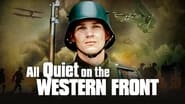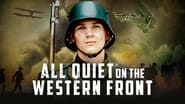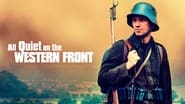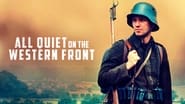quantum_22
This movie is clearly underrated when compared to THE moral beacon of war movies: "Full Metal Jacket". For several reasons, I find this masterpiece on par with the latter film by Stanley Kubrick.First, there is the clear notion of the "dehumanization process" at the start of both films, but in my opinion, the viewer is better reminded of this process towards the end of this film, when we see the main character reflect on the past years and concludes that he has been transformed into a broken man, only to realize that he will never fit into normal life again. In this respect, the final scene is almost merciful.Secondly, when watching the film I was reminded of an HBO documentary I saw last week about PTSD and war trauma. "All quiet on the Western front" managed to capture the very essence about this condition in a time where the term "PTSD" hasn't even been coined (as far as my sources are accurate, that was only in the next year, 1980, and it was still very much of a mystery at that time).Add to that the superb performances and compelling screen play, and I can only conclude that this film is an absolutely must see!
Robert J. Maxwell
It took author Erich Maria Remarque two years to find a publisher for his novel about the defeat of the German Army in World War I. Remarque himself had fought in the trenches and been wounded, so he knew whereof he wrote. It's curious that that horrifying and mis-managed war and its humiliating peace agreement generated disparate reactions in Germany. "Stabbed in the back" by politicians, said Hitler, who had also fought and been wounded, as he rose to power. Then there was Remarque, who represented the other path, which could be roughly summarized as, "It was pretty lousy. Let's not do it again." Hitler's attitude won, of course, and it was then claimed that Remarque's real name was Kramer, a Jewish name, which Remarque had spelled backwards to disguise his ethnic identity.It's not surprising that this should be called an anti-war movie. What's surprising about it is that it actually IS an anti-war movie. Remarque was a German and Germany lost the war. Not through treachery, like Pearl Harbor, and without heroic last stands, like Bataan or Wake Island or the Battle of Little Big Horn, and without miraculous last-minute escapes, like "Dunkirk". It was written by a member of the army that lost and it depicts the declining élan and eroding resources of the civilization sponsoring that war.Few producers are willing to bet on a genuine anti-war movie, one that lacks glory and makes viewers feel sad and uncomfortable. That's why we see movies like "Private Ryan" (we won) and not movies with titles like "The Java Sea" (we lost).We're pretty generous with the term "anti-war" when applying it to movies, but there's a relatively simple way to judge whether it applies aptly. If we lose, without any excuses, it's "anti-war." "Blackhawk Down" is anti-war but there are few others, and for good reason. Producers like the audience to leave the theater glowing with satisfaction, as if they'd just seen their home team win a football game.This is a television remake of the 1930 original with Lew Ayres. Richard Thomas has the lead. I never found Richard Thomas particularly appealing. His demeanor and appearance suggest a spoiled prep school kid, but he's quite good here. Make up has wisely left him and the rest of his infantry company pasty faced and ill groomed. In an adaptation of another of Remarque's novels, "A Time To Love And A Time To Die," the protagonist at the front is uber-handsome John Gavin whose bare, heroic figure sports a sun tan bespeaking Malibu, not Stalingrad. The supporting cast here is equally good.In fact, as TV remakes go, Delbert Mann and his cast and crew have done an unexpectedly good job. Unlike the 1930 original, this is stretched out over several hours and the writers have declined the opportunity to pad it out with a love story involving Thomas and some luscious babe who was his high-school sweetheart. Instead the writers have included more of Remarque's incidents, including a terrifying and wrenching scene of a dozen wounded horses screaming and dying. Modern audiences rarely cringe when they watch a stranger blown apart on screen. But HORSES? Now that's REALLY anti-war.
MARIO GAUCI
This is one of three DVD editions of made-for-TV movies that I rented in order to pay belated tribute to Oscar-winning director Mann who died last month (the others being HEIDI [1968] and JANE EYRE [1970]).I'd always resisted watching this version of the celebrated Erich Maria Remarque novel, because I thought that it couldn't possibly hold a candle to the classic 1930 original directed by Lewis Milestone; needless to say, this turned out to be true but, even if the edition I watched was trimmed by some 20 minutes from the full-length 150-minute broadcast, the film survives as a pretty decent rendering of the novel's anti-war sentiment. Combining meticulous period detail with elaborate battle sequences and reasonable narrative skill (not least in the way it adopts flashbacks throughout the first half), it nevertheless lacks the overall impact of Milestone's classic mainly because of a bland young cast (Richard Thomas as Paul Baumer may be closer to the character's age as depicted in the novel, but he never achieves the haunting quality of Lew Ayres' performance in the original). It falls especially short when directly re-creating memorable scenes or moments from the 1930 film (such as a pair of disembodied hands hanging onto a barbed-wire fence, or when Baumer spends the night in a foxhole beside a French soldier slowly dying from his bayonet wound); the famous ending has also been slightly altered…but, then, there are other good scenes here: notably, when a number of horses are wounded during an air-raid – which causes consternation to one of the soldiers who had been a farmer as a civilian – and the gas attack, which would mean a very painful death for anyone succumbing to it.The supporting cast is a distinguished one, led by a fine Ernest Borgnine as the seasoned Katczinky; Ian Holm is the iron-fisted Himmelstoss; Donald Pleasence the fanatical schoolteacher; and Patricia Neal has a bit as Baumer's sick mother. As I said earlier on, Paul Monash's script manages to capture Remarque's basic idea of a country's youth having their innocence despoiled through combat; similarly, John Coquillon's grimy cinematography is instrumental in bringing out the proverbial 'war is futile' atmosphere.
tklaja007
I didn't think "All Quiet on the Western Front" was a good movie at all. It was very boring to me. Parts that were supposed to be exciting from what we read in the book in class were a serious letdown when I saw the movie. Especially the fighting scenes. Another thing that I didn't like about the movie is that parts that were made out to be key, vital points in the story in the book were not made very important in the movie. For example, when Paul and his friends meet the French girls, it was a key point in the book about Paul maybe finding love in his life for the first time ever and him ending up disappointed and right back to where he started. It was very detailed in the book. However, in the movie it was rushed by like it didn't even matter. Another part that I thought would be interesting in the movie is when Paul goes on leave. I thought it would be a good part in the movie because it took up a big part of the book and a lot of things happened- Paul finding out about his mother, visiting Kemmerich's mother, etc.- but it was just another boring part in the movie. Also, when Paul returns to the front to battle, it was way more intriguing in the book because it actually explained how Paul was feeling, but it didn't seem that way at all in the film. I also noticed that events were in a different order from how they were in the book, which I didn't like. All of this is why I think this film should be remade. I don't think these actors played their roles very well. There are talented actors around now that could do a really good job to do it better. There are also wonderful directors who can make scenes more interesting for the viewers.









